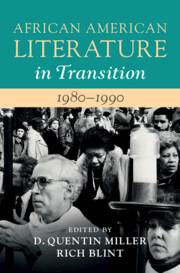Book contents
- African American Literature in Transition, 1980–1990
- African American Literature in Transition
- African American Literature in Transition, 1980–1990
- Copyright page
- Contents
- Notes on Contributors
- Preface
- Introduction
- Part I The Expanding Canon
- Part II New Directions/New Literary Forms
- Part III Global Connections
- 9 Decolonial Poetics and Queer Resistance in Anglophone Afro-Caribbean Women’s Literature
- 10 Transnational Visions of Black Women Writing
- 11 Ruination and a Dramaturgical Reading of Jamaican Women’s Transnational Literature in 1980s North America
- Index
10 - Transnational Visions of Black Women Writing
from Part III - Global Connections
Published online by Cambridge University Press: 02 February 2023
- African American Literature in Transition, 1980–1990
- African American Literature in Transition
- African American Literature in Transition, 1980–1990
- Copyright page
- Contents
- Notes on Contributors
- Preface
- Introduction
- Part I The Expanding Canon
- Part II New Directions/New Literary Forms
- Part III Global Connections
- 9 Decolonial Poetics and Queer Resistance in Anglophone Afro-Caribbean Women’s Literature
- 10 Transnational Visions of Black Women Writing
- 11 Ruination and a Dramaturgical Reading of Jamaican Women’s Transnational Literature in 1980s North America
- Index
Summary
Focusing on the world-making capacities of 1980s Black women writers, this chapter sheds light on a largely occluded constellation of actual travel and transnational imaginaries. A complex of somatic and imaginative expressions of geographic desire came to define contemporary Black women’s literature. The chapter tracks Black women’s increasingly self-determined and communal efforts not only to move and write across global spaces but also to bring such hemispheric, diasporic, and Third World spaces into being. A host of prominent Black women writers forged global identities and relations by engaging in progressively autonomous international travel in the 1970s and 1980s to places such as Nicaragua, North Vietnam, the Soviet Union, and Grenada. In doing so, they transgressed US foreign policies and State Department travel restrictions while also rerouting the Black internationalism of “race men” such as Robeson and Du Bois and rescripting Hemingway’s cosmopolitanism and Baldwin’s exile. Jordan, Lorde, and Bambara brought their geographic potency to bear on dominant geographies by prioritizing Third World self- and collective-fashioning, Third World care, and radical dislocation.
- Type
- Chapter
- Information
- African American Literature in Transition, 1980–1990 , pp. 212 - 234Publisher: Cambridge University PressPrint publication year: 2023
- 1
- Cited by

